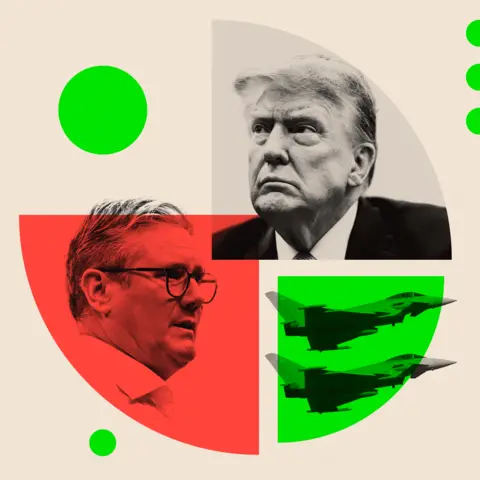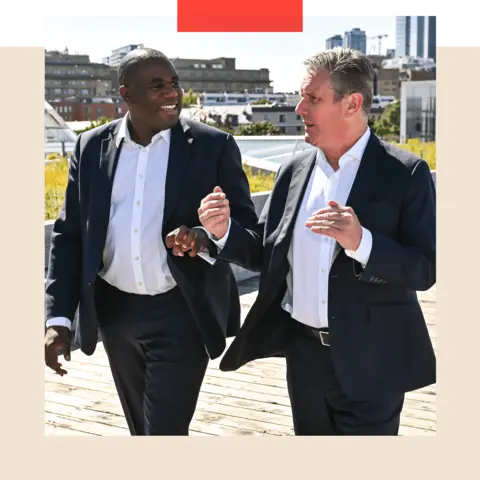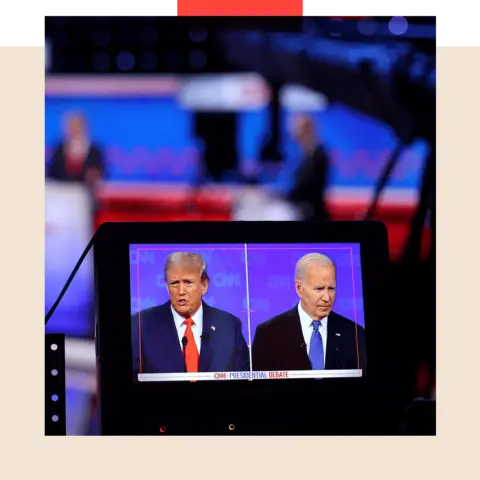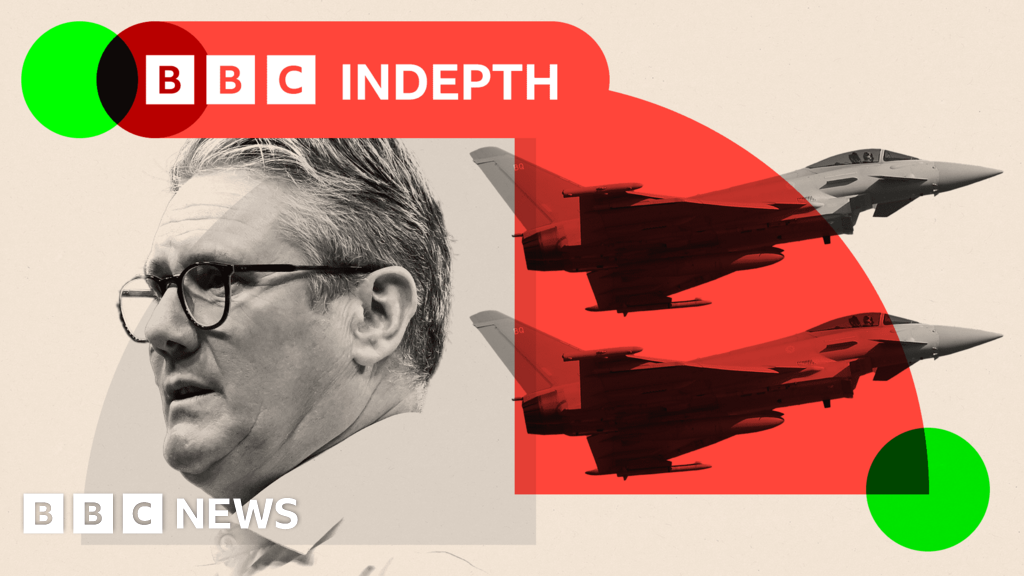
 Getty Images
Getty ImagesWhen it comes to Britain’s relationship with the United States, the new government has a simple watchword: continuity. One of Sir Keir Starmer’s first calls in office was to President Joe Biden. Unusually, Downing Street even published footage and audio of the prime minister making the call.
To the relief of officials, Mr Biden uttered the words “special relationship”.
With those words ringing, Mr Starmer heads to Washington DC this week for the Nato summit where he and his wife will attend a dinner at the White House. To the even greater relief of officials, the President will hold a private meeting with the prime minister, not something all Nato leaders will get.
The PM is going mob-handed with his defence and foreign secretaries, John Healey and David Lammy. The message could not be clearer: the transatlantic relationship remains the bedrock of UK foreign policy.
Much will be made of Mr Lammy’s American credentials: he has lived, studied and worked in the US. He has family there; his father is buried in Texas. He boasts regularly that he has visited the US more than France.
Allow Google YouTube content?
But it would be a mistake to think Labour is throwing its lot in with a politically sympathetic Democratic president and administration. “Whoever is in the White House or Number 10 in a big election year, we must work together,” Mr Lammy told the Institute for Government recently, nodding towards the prospect of Donald Trump re-entering the White House.
Back in 2018, Mr Lammy called the former US president “a woman-hating, neo-Nazi-sympathizing sociopath” and a “profound threat to the international order”. It wasn’t a one off: he has also accused Mr Trump of promoting racism and separately labelled him a fascist.
Since then, the foreign secretary has been on quite a journey and has been working hard to build a relationship with Republicans and allies of Mr Trump. In recent months he has met an array of Trump campaign advisers – past and present – along with Republican members of Congress, including possible Trump running mate JD Vance, whom Mr Lammy refers to as “my friend”.
And in a speech to the conservative Hudson Institute in Washington in May, Mr Lammy said Mr Trump’s uncertain commitment to European security had been “misunderstood”.
The message from both Downing Street and the Foreign Office is this Labour government will work with whoever lives in 1600 Pennsylvania Avenue.
Yet Labour’s preparation for a possible Trump presidency is not limited to pragmatic engagement with his team. The government is also preparing a foreign policy that assumes the long-term trend of US detachment from Europe will continue, alongside growing economic protectionism and a greater focus on domestic US issues. And that will mean the UK doing less with the US and more with other international partners.
A changed relationship with the EU
Take Europe. In recent days both Mr Starmer and Mr Lammy have emphasised their plans to agree a defence and security pact with the European Union (EU), most likely a non-legally binding political declaration. They have made clear they envisage a broad definition of security, including anything from energy and climate change to pandemics and illegal migration.
It could even involve some kind of UK participation in the European Defence Fund, the body that coordinates EU cooperation on defence research. There is talk of an early bilateral defence agreement with Germany. Mr Lammy may attend a meeting of EU foreign ministers in September.
 Getty Images
Getty ImagesOn one level this is Labour’s way of trying to reset Britain’s relationship with the EU post-Brexit, using defence as a way of building bridges and fostering trust. They hope this could eventually help to improve trade relations with the EU – to boost economic growth – while not unpicking the Brexit settlement, a political row they wish to avoid. But the policy is also a more fundamental recognition that Europe as a continent needs to do more to defend itself and rely less on America’s security blanket.
Iron-clad on Ukraine
This is equally true of Ukraine. Kyiv fears US support could weaken if Mr Trump is re-elected. Much of this week’s Nato summit will be about how the alliance can “future proof” military support for Ukraine against American political volatility. Labour has gone out of its way to show that London’s backing will remain “iron-clad” despite the change in government, sending Mr Healey on a visit and announcing more military aid within hours of his appointment.
But none of this will be easy. Labour is promising to increase defence spending to 2.5% of national output, currently about 2.3%. But that will happen only when a strategic defence review is completed and the Treasury says there is enough tax revenue in its coffers, two conditions no one expects to be achieved soon.
And as for greater cooperation with the EU on defence, that will have to wait for the new European Commission to be formed later this year; it will come at a cost of long and difficult negotiations involving many compromises demanded by EU member states; and few expect France to allow the UK much access to lucrative European defence markets by easing EU procurement rules.
On climate change, Mr Lammy wants to forge what he calls a “clean power alliance” of developed and developing countries that are committed to generating renewable energy in coming years. He envisages a kind of energy alliance similar to that among oil producing nations, namely OPEC.
This is designed to reclaim some of the economic and technical market in renewables from China. But it is also a policy that does not involve the UK looking across the Atlantic and depending on a president who once described climate change as a hoax and who could take the US out of the Paris climate agreement.

The foreign secretary has a similar approach towards developing countries, known collectively as the “global south”. He says he wants to “reconnect” the UK with countries that felt ignored or lectured by British ministers in the past, countries denied access to western Covid vaccines or adequate climate finance.
The strategic aim – one also adopted by Mr Lammy’s predecessor, Lord Cameron – is to deny countries like China a free hand when it comes to diplomatic and trade opportunities in Africa and Asia. But again, this is a policy that does not involve the UK being dependent on what Washington is thinking.
 Getty Images
Getty ImagesAs for Britain’s relationship with China, Labour wants to “compete, challenge and cooperate” with Beijing. That is in stark contrast to bipartisan opinion in Washington that sees China as a long-term strategic threat.
Labour is promising a full audit of UK-China relations. But if Donald Trump wins, there are fears he could trigger a full-scale trade war with China that could damage European economies and leave Labour’s central growth plan in ruins.
A tactical tweak on the Middle East?
Where the government has less room for manoeuvre is the Middle East. The US is the biggest player in the region and drives western policy. The UK has much less influence. Mr Lammy may at some point renew Britain’s funding for the UN agency in Gaza, UNWRA, drop a UK attempt to delay the International Criminal Court’s decision on issuing an arrest warrant for Israel’s Prime Minister Benjamin Netanyahu and even restrict UK arms sales to Israel.
This would ruffle feathers in Washington but might be seen by analysts as internal Labour politics designed to counter the loss of a handful of seats to pro-Gaza candidates in last week’s general election. It would not change the fundamentals on the ground which remain bleak.
There are growing fears of a possible Israeli attack on Hezbollah in Lebanon with bloodshed on a mass and devastating scale. Would the UK support any US military action? Would Mr Starmer deploy British forces in harms’ way to rescue British nationals in Beirut?
With US political leadership so uncertain, the government is having to hedge its geopolitical bets. Mr Lammy may be an avowed Atlanticist. But his first official words as foreign secretary did not mention the US once. Instead he declared: “We will begin with a reset with Europe, on climate and the global south.”
BBC InDepth is the new home on the website and app for the best analysis and expertise from our top journalists. Under a distinctive new brand, we’ll bring you fresh perspectives that challenge assumptions, and deep reporting on the biggest issues to help you make sense of a complex world. And we’ll be showcasing thought-provoking content from across BBC Sounds and iPlayer too. We’re starting small but thinking big, and we want to know what you think – you can send us your feedback by clicking on the button below.


